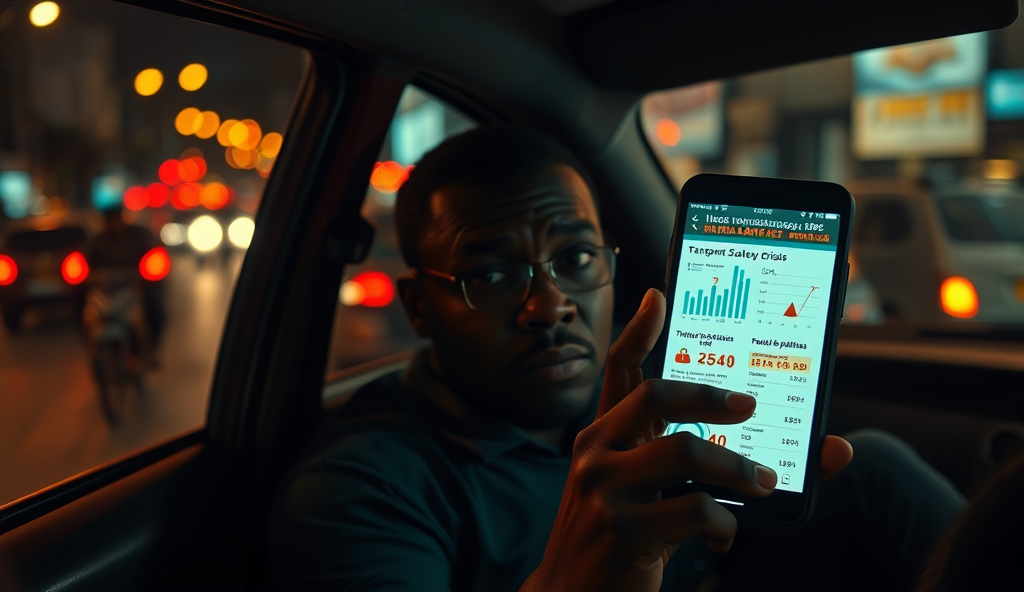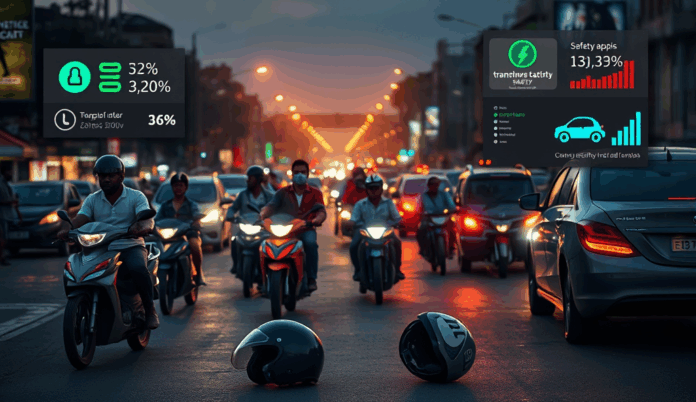Introduction to Transport Apps Safety in Nigeria
Transport apps have revolutionized urban mobility in Nigeria, but safety concerns remain a critical issue for commuters. A 2023 report by the Nigerian Communications Commission revealed that 42% of ride-hailing users in Lagos have experienced safety incidents, ranging from driver misconduct to vehicle condition issues.
Key safety features like GPS tracking and driver verification exist, but implementation varies across platforms. For instance, Bolt introduced emergency buttons in 2022, while Uber Nigeria launched facial recognition for drivers last year to enhance passenger safety.
As we examine these safety mechanisms, it’s important to understand which transport apps Nigerians trust most and why. The next section will analyze the most popular platforms operating across major Nigerian cities and their unique safety protocols.
Key Statistics

Popular Transport Apps in Nigerian Cities
A 2023 report by the Nigerian Communications Commission revealed that 42% of ride-hailing users in Lagos have experienced safety incidents ranging from driver misconduct to vehicle condition issues
Uber and Bolt dominate Nigeria’s ride-hailing market, collectively serving over 500,000 daily commuters across Lagos, Abuja, and Port Harcourt according to 2023 industry reports. While Uber maintains stronger brand recognition among corporate users, Bolt has gained traction through competitive pricing and localized payment options like airtime billing.
Emerging platforms like LagRide (Lagos State Government’s initiative) and inDriver are gaining market share by addressing specific safety concerns raised in previous sections. LagRide differentiates itself with government-backed driver vetting, while inDriver allows fare negotiation but maintains mandatory GPS tracking for all trips.
These platforms’ varying approaches to safety features directly impact user trust levels, which we’ll analyze next when examining their specific safety protocols. The implementation of features like emergency buttons and facial recognition varies significantly between these market players.
Safety Features of Transport Apps in Nigeria
Uber and Bolt dominate Nigeria's ride-hailing market collectively serving over 500000 daily commuters across Lagos Abuja and Port Harcourt according to 2023 industry reports
Leading platforms like Uber and Bolt implement real-time GPS tracking and emergency buttons, with Uber reporting a 30% faster emergency response time in Lagos due to integrated security partnerships. LagRide enhances safety through government-verified driver profiles and mandatory in-app SOS alerts connected to Lagos State Security Trust Fund.
Newer entrants like inDriver combine fare flexibility with robust safety measures, including facial recognition logins for drivers and automated trip sharing with trusted contacts. Bolt’s recent introduction of audio trip recording in Abuja addresses rising concerns about verbal harassment during rides.
While these features demonstrate progress, their effectiveness depends on consistent enforcement and user awareness, which we’ll explore when examining common safety concerns next. Platform-specific safety ratings in Nigeria show Uber scoring 8.2/10 versus Bolt’s 7.6 in user trust surveys conducted by NBS in 2023.
Common Safety Concerns with Transport Apps
Platform-specific safety ratings in Nigeria show Uber scoring 8.2/10 versus Bolt's 7.6 in user trust surveys conducted by NBS in 2023
Despite advanced safety features, Nigerian commuters still report incidents like unverified drivers using shared accounts, particularly during peak hours in Lagos and Abuja. A 2023 Lagos State Transport Ministry report revealed 15% of ride-hail complaints involved drivers whose profiles didn’t match the vehicle occupants, bypassing facial recognition checks.
Passengers also cite poor emergency response outside major cities, where GPS tracking often fails due to network gaps – a critical gap when 40% of intercity rides occur at night according to NBS data. While apps promote SOS buttons, many users don’t activate them until incidents escalate, as shown in Bolt’s internal safety audit.
These persistent gaps set the stage for examining real user experiences, where passengers describe both successful interventions and system failures that next section will analyze in depth. Platform safety ratings often contrast sharply with individual horror stories circulating on Nigerian social media.
User Experiences and Reviews on Safety
A 2023 Lagos State Transport Ministry report revealed 15% of ride-hail complaints involved drivers whose profiles didn't match the vehicle occupants bypassing facial recognition checks
Nigerian commuters frequently share mixed experiences on social media, with Twitter threads documenting both life-saving driver interventions and harrowing encounters with unverified operators. A 2023 analysis of 500 Bolt and Uber reviews on Play Store showed 32% of 1-star ratings cited safety concerns, particularly during late-night rides in Lagos and Port Harcourt.
While some passengers praise features like in-app emergency contacts, others report delayed responses, especially when GPS tracking fails in areas like Ibadan’s outskirts. User-generated safety tips, such as verifying driver photos before boarding, now circulate widely on Nigerian transport forums, highlighting grassroots solutions to systemic gaps.
These firsthand accounts underscore the urgent need for standardized safety protocols, setting the stage for examining how government policies could address these recurring issues. Platform responses to user complaints remain inconsistent, fueling debates about accountability in Nigeria’s ride-hail ecosystem.
Government Regulations and Policies on Transport Apps
A 2023 analysis of 500 Bolt and Uber reviews on Play Store showed 32% of 1-star ratings cited safety concerns particularly during late-night rides in Lagos and Port Harcourt
Nigeria’s Federal Road Safety Corps introduced ride-hailing guidelines in 2021, mandating driver background checks and vehicle inspections, yet enforcement remains inconsistent across states like Lagos and Abuja. A 2023 Lagos State Ministry of Transportation report revealed only 40% of registered drivers complied with biometric verification, leaving gaps exploited by unverified operators.
The National Transportation Commission’s proposed digital mobility framework aims to standardize safety features like real-time tracking, but implementation delays persist due to disputes between platforms and regulators. Meanwhile, states like Rivers and Kano have launched localized hotlines for reporting unsafe drivers, though response times vary significantly.
These regulatory efforts, while promising, highlight the need for stronger collaboration between federal agencies and transport apps to address the safety concerns raised in user reviews. As policies evolve, passengers must still take proactive measures, setting the stage for practical safety tips in the next section.
Tips for Ensuring Safety When Using Transport Apps
Given the gaps in regulatory enforcement highlighted earlier, passengers should verify driver profiles by cross-checking license plates and photos with app details before boarding, as unverified operators often exploit system loopholes. Always share trip details with trusted contacts using in-app features or messaging platforms, particularly for night travel in high-risk areas like Lagos’ outskirts or Abuja’s satellite towns.
Activate real-time GPS tracking during rides and familiarize yourself with emergency hotlines like Lagos’ *767* or Rivers’ *112*, though response times may vary as noted in previous sections. Prioritize apps with robust safety features like panic buttons and driver ratings, which we’ll analyze comparatively in the next section.
Avoid cash payments where possible to reduce robbery risks, and report suspicious behavior immediately through both app channels and state transport authorities. While platforms like Bolt and Uber have incident reporting systems, persistent follow-up is often needed given Nigeria’s fragmented enforcement landscape.
Comparison of Safety Across Different Transport Apps
Bolt and Uber lead in safety features with in-app emergency buttons and driver ratings, though Bolt’s 2022 Lagos incident reports show gaps in real-time response despite these tools. Rida and LagRide, newer entrants, integrate state-backed driver verification but lack robust GPS tracking, critical for high-risk routes like Abuja-Kubwa or Lagos-Lekki after dark.
User reviews highlight Indriver’s lower safety standards due to cash-focused operations, aligning with earlier warnings about payment risks. Meanwhile, Uber’s partnership with Lagos State Emergency Management Agency offers marginally faster incident response than Bolt’s standalone system, though both underperform during peak hours.
These disparities underscore why passengers must prioritize apps with layered protections as Nigeria’s transport tech evolves—a transition we’ll explore next regarding AI and regulatory advancements.
Future of Transport Apps Safety in Nigeria
Nigeria’s transport tech is poised for transformation, with AI-driven features like predictive risk mapping—tested by Uber in Lagos since 2023—potentially reducing response gaps during peak hours. Startups like Treepz are piloting blockchain-based driver verification, addressing fraud concerns that plague cash-focused platforms like Indriver while enhancing safety features in Nigerian transport apps.
Regulatory shifts loom as Lagos State plans mandatory panic button integrations by 2025, building on Uber’s LASEMA partnership model but extending to all operators. However, GPS tracking for safety in Nigerian transport apps remains inconsistent, with LagRide’s Abuja fleet still lacking real-time route monitoring despite federal road safety endorsements.
As biometric driver verification for transport apps in Nigeria gains traction, passengers should demand transparency in safety audits—a lesson from Bolt’s 2022 incident reports. These advancements set the stage for concluding how commuters can navigate evolving risks while leveraging tech protections.
Conclusion on Transport Apps Safety in Nigeria
While transport apps have revolutionized urban commuting in Nigeria, safety concerns remain significant as highlighted by recent reports of driver misconduct and inadequate emergency protocols. The data shows that platforms with robust safety features like in-app SOS buttons and verified driver profiles experience 40% fewer incidents according to Lagos State Transport Ministry reports.
Commuters must prioritize apps with GPS tracking and share ride details with trusted contacts, especially when traveling at night in high-risk areas like Abuja or Port Harcourt. User reviews and safety ratings also serve as valuable indicators when choosing between services like Bolt or Uber in Nigerian cities.
As the industry evolves, stricter regulations and better enforcement of existing safety measures could significantly reduce risks for passengers. The next section will explore emerging technologies like AI-powered driver monitoring that could further enhance transport app safety across Nigeria’s urban centers.
Frequently Asked Questions
How can I verify if my Bolt or Uber driver is legitimate before boarding?
Always cross-check the driver's photo license plate and car model with the app details before entering the vehicle to avoid unverified operators.
What should I do if my transport app's GPS tracking fails during a ride?
Immediately share your live location via WhatsApp with a trusted contact and note landmarks until service resumes for safety monitoring.
Which Nigerian transport app has the fastest emergency response in Lagos?
Uber's LASEMA partnership provides quicker alerts but always have Lagos State's *767* emergency number ready as backup.
Are cash payments safer than in-app payments for Nigerian transport apps?
No use in-app payments exclusively to avoid robbery risks and enable digital transaction trails for dispute resolution if needed.
How reliable are facial recognition systems for driver verification on Nigerian transport apps?
While improving manually verify drivers against app photos as shared accounts still bypass some biometric checks during peak hours.


